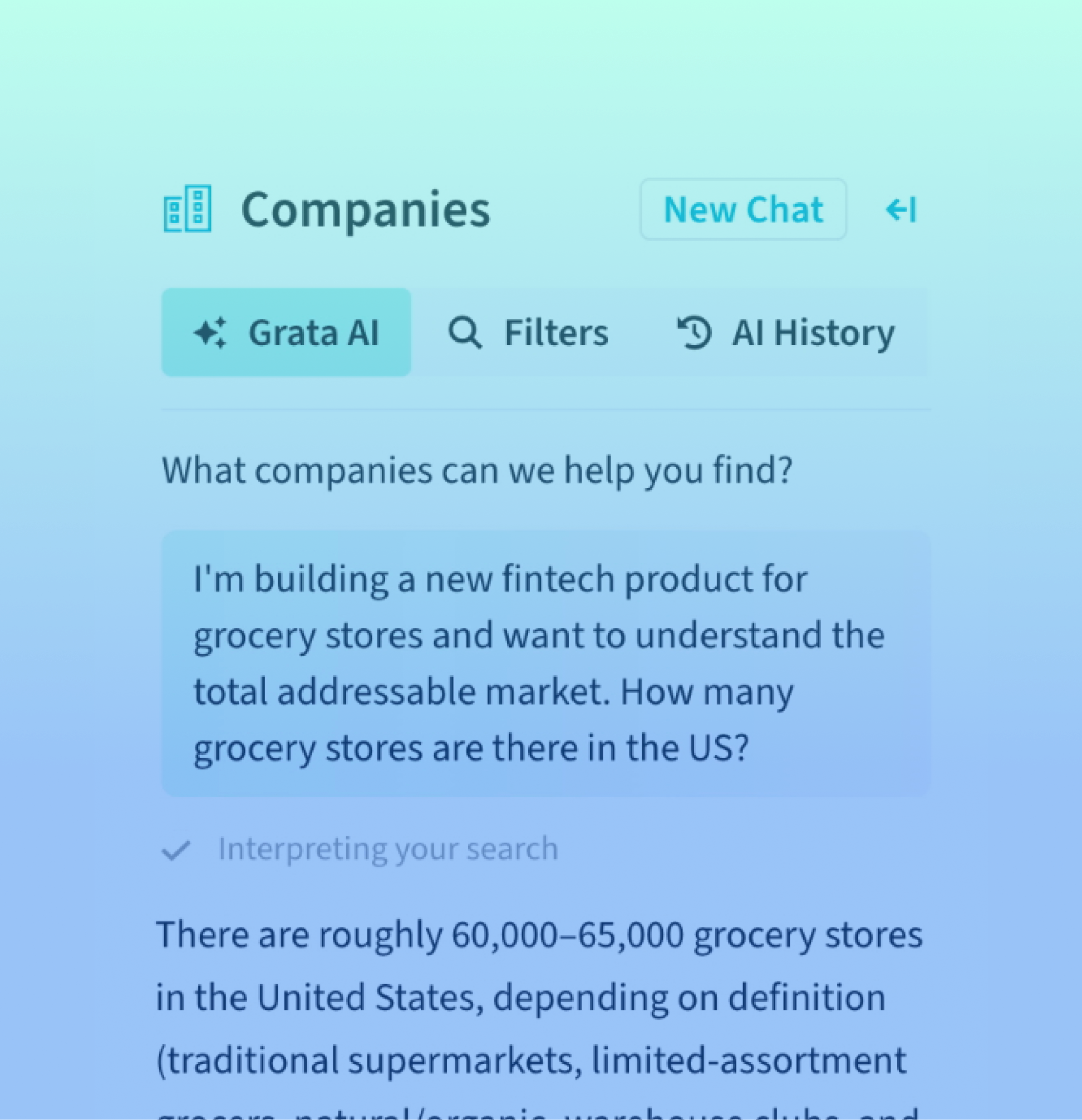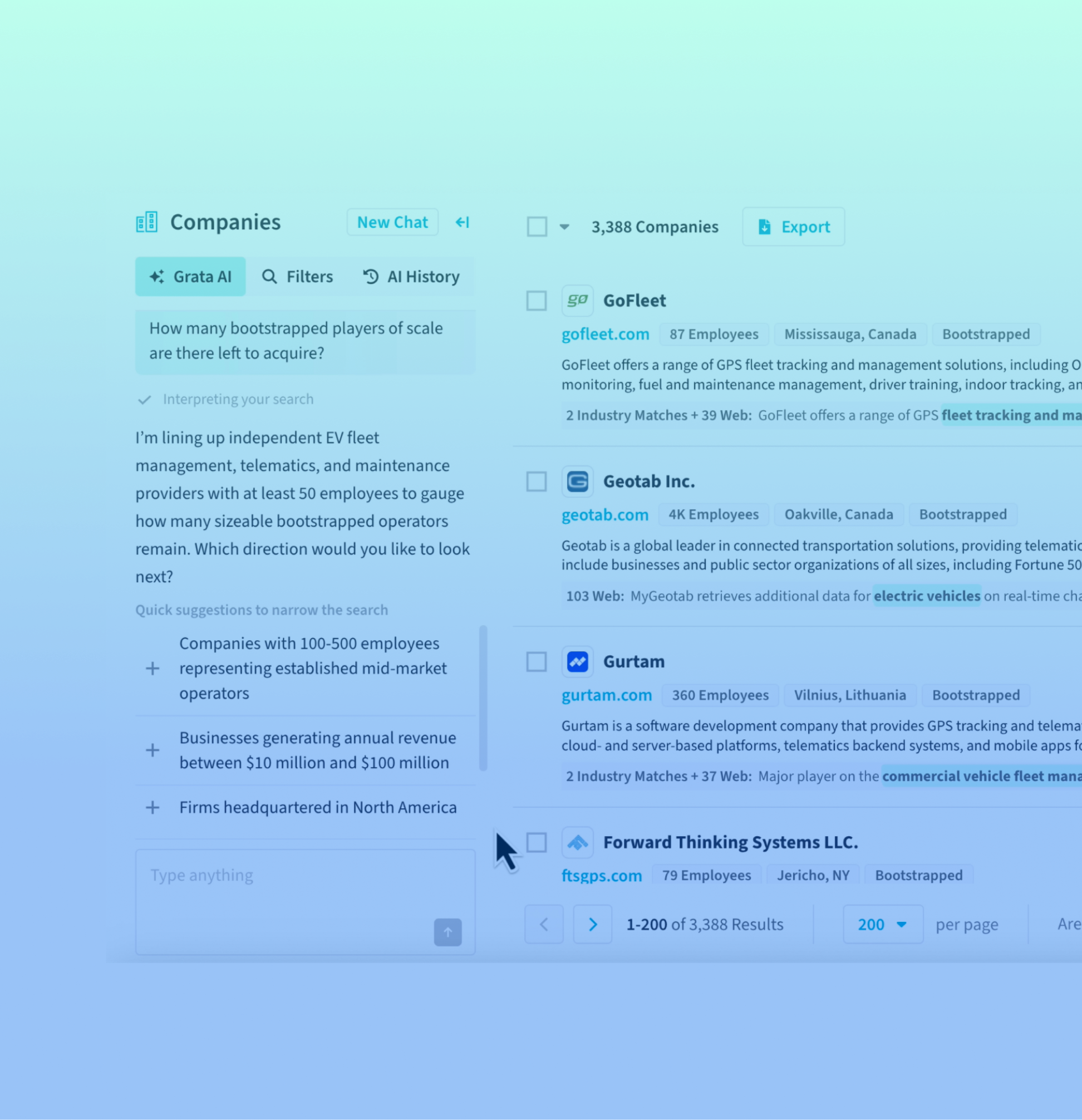Private equity (PE) firms have long relied on human expertise, market knowledge, and intuition to identify deals and drive value. Now, amid the rise of artificial intelligence (AI) tech, the industry seems primed for a shift.
Investors are increasingly integrating AI into their private equity workflows to enhance analytics, predictive modeling, and operational efficiencies by processing vast data quickly.
In this article, we break down how AI can help private equity firms stay competitive in a fast-evolving market, how firms can use the tech most effectively, and the challenges to avoid.
Transforming Deal Sourcing with AI
Identifying promising investment targets has become increasingly challenging for private equity firms. Relying on networks, manual research, and other traditional methods of deal sourcing often falls short in a fast-moving market.
AI addresses this challenge by using advanced data analytics to sift through massive amounts of structured and unstructured data. By analyzing market trends, company performance, and financial metrics, AI can uncover hidden opportunities that might otherwise be overlooked. It streamlines the process and provides firms with deeper insights and a broader view of potential targets.
AI-powered platforms can analyze company websites, financial statements, and even news reports to identify businesses aligned with specific investment criteria. Grata, for instance, helps users source 2-6x more deals using its advanced AI capabilities.
AI-Driven Market Research
AI-powered algorithms change how firms analyze publicly available data sources like census data, social demographics, and consumption patterns. These tools enable private equity firms to go beyond traditional methods and uncover insights that drive smarter investment decisions.
By using machine learning models, AI can generate scores to evaluate the attractiveness of specific regions or industries. These models consider numerous variables, such as growth potential, market size, and consumer trends. This allows firms to prioritize the best investment opportunities.
For example, Grata’s powerful AI allows users to create markets using search terms, specific companies, industry classifications, or pre-built or custom company lists. The AI identifies similarities and adjacencies and uses those to assemble market comparables. Grata users can see a full market perspective — including M&A transactions, public comps, private comps, VC & growth comps, and fragmentation data — in one cohesive snapshot.
With these tools, firms can quickly narrow down targets, ensuring they focus resources on high-impact opportunities.
Proprietary Investment Engines
Proprietary investment engines are AI-powered systems developed by private equity firms to gain a competitive edge in deal sourcing and evaluation. These engines are tailored to each firm's specific investment strategy, criteria, and historical data, allowing them to process information in a way that aligns with the firm's unique approach and expertise.
By leveraging advanced algorithms, these engines generate data-backed scenarios that allow firms to predict market shifts and evaluate potential investments more accurately. They assess financial performance, industry trends, market dynamics, and other variables to build a comprehensive decision-making framework.
This framework equips private equity firms with the ability to move swiftly in the market and capitalize on the opportunities before their competitors.
Streamlining Due Diligence with AI
Due diligence is a critical step in private equity investing. It ensures firms thoroughly evaluate the risks and potential rewards of an acquisition. Traditionally, this process involves sifting through vast amounts of financial, legal, and operational data, a time-consuming and labor-intensive task.
AI can streamline due diligence by automating complex tasks like assessing financial reports, legal documents, and market trends, and highlighting innovation opportunities and red flags. This not only speeds up the process but also reduces the risk of human error.
Additionally, AI enables firms to develop data-backed investment hypotheses, using predictive analytics to model potential outcomes. These insights empower firms to evaluate investment prospects more confidently and make faster decisions.
Technical Data Evaluation
Private equity firms often find it challenging to assess the feasibility of technological solutions and product development lifecycles. These evaluations tend to require deep technical knowledge and a detailed understanding of a company’s innovation pipeline, which can be difficult to analyze at scale.
AI systems, guided by data scientists, address this complexity by offering precise technical data evaluation. These systems can analyze product performance metrics, research and development timelines, and market adoption rates with unparalleled speed and accuracy. By identifying trends and potential bottlenecks, AI provides insights that help firms gauge the feasibility and long-term success of technological innovations.
AI-driven analysis helps private equity firms make more informed investment decisions. This reduces uncertainty and enhances firms’ ability to back cutting-edge technologies with confidence.
Algorithm-Powered Investment Hypotheses
AI plays a pivotal role in developing investment hypotheses by analyzing vast datasets that encompass market trends, customer behavior, and competitive landscapes. Through advanced algorithms, AI systems can identify patterns and correlations that may not be immediately apparent to human analysts.
For example, Grata's AI-powered platform can analyze over 12 million companies, offering insights into market dynamics and competitive positioning. PE firms can then more effectively anticipate market shifts and emerging opportunities.
These AI-generated hypotheses can simulate multiple scenarios, considering various market conditions, regulatory changes, and competitive moves. By running thousands of simulations in a matter of minutes, AI can provide PE firms with a range of potential outcomes for each investment opportunity. This capability allows firms to stress-test their investment theses and better understand the potential risks and rewards associated with each deal.
Customized Insights for Competitive Advantage
The collaboration between data scientists and investment teams is creating a new paradigm in private equity. AI-driven insights are tailored to align perfectly with a firm's unique investment strategy. This synergy allows PE firms to leverage AI not just as a general tool, but as a customized asset that reflects their specific expertise, risk appetite, and market focus.
These customized insights go beyond generic market analysis. Data scientists work closely with investment professionals to fine-tune AI algorithms, ensuring they capture the nuances of the firm's investment philosophy. This might involve weighting certain factors more heavily, incorporating proprietary data sources, or developing custom metrics that align with the firm's unique value-creation strategies.
The customized nature of these insights means they're not easily replicable by competitors, even if they're using similar AI tools. And as these AI systems continue to learn and refine their outputs based on the firm's decisions and outcomes, the competitive advantage compounds over time.
Optimizing Portfolio Management with AI
AI is influencing portfolio management in private equity, extending its impact well beyond the deal-sourcing and due diligence phases. Post-investment, AI-driven solutions are becoming crucial tools for supporting portfolio companies and driving value creation. These technologies enable PE firms to make data-driven decisions, identify operational inefficiencies, and uncover growth opportunities across their entire portfolio.
AI's role in portfolio management is multifaceted. It informs forecasting by analyzing historical data and market trends to predict future performance with greater accuracy. For pricing optimization, AI algorithms can analyze vast amounts of market data, competitor pricing, and customer behavior to suggest optimal pricing strategies. In terms of process automation, AI is streamlining manual tasks across various business functions, from finance to supply chain management.
For instance, Grata's API can be integrated into a firm's existing systems, allowing for continuous monitoring and analysis of portfolio companies' performance against industry benchmarks.
The data-driven insights provided by AI enable PE firms to make more informed decisions about resource allocation, exit timing, and add-on acquisitions. As a result, portfolio companies can achieve accelerated growth and improved operational efficiency. This leads to higher valuations and better returns for investors.
Data-Driven Insights
AI excels at extracting actionable insights from diverse data sources, including financial reports, market data, and customer behavior patterns. These insights allow private equity firms to identify inefficiencies and areas for improvement within their portfolio companies.
AI-driven insights also help guide strategic decision-making by providing a clear, data-backed picture of a company's strengths, weaknesses, and opportunities. For instance, AI algorithms can optimize product offerings by analyzing customer purchase patterns, feedback, and market trends. PE firms can then make more informed decisions about resource allocation, strategic pivots, and potential exits.
Process Automation
AI’s ability to automate repetitive tasks is transforming how private equity firms manage their portfolio companies. By taking over labor-intensive processes such as data entry, reporting, and compliance monitoring, AI frees up human resources to focus on higher-value strategic initiatives.
In supply chain optimization, AI algorithms can analyze vast amounts of data to predict demand, optimize inventory levels, and streamline logistics. For example, AI can forecast seasonal demand fluctuations, allowing companies to adjust their inventory and production schedules accordingly.
Talent management is another area where AI is making significant strides. AI-powered systems can streamline the recruitment process by screening resumes, scheduling interviews, and even conducting initial candidate assessments.
Automating these processes allows AI firms to operate more efficiently, reduce human error, and drive value across the portfolio.
Pricing Optimization
AI is revolutionizing pricing strategies for portfolio companies by analyzing complex market conditions and demand fluctuations in real time. These sophisticated algorithms can process vast amounts of data, including competitor pricing, consumer behavior, economic indicators, and historical sales data, to suggest optimal pricing models.
AI-driven pricing optimization enables portfolio companies to implement dynamic pricing strategies that respond swiftly to market changes. These systems can identify opportunities for price increases during peak demand periods or suggest targeted discounts to stimulate sales during slower times. They can also segment customers based on their willingness to pay, allowing for personalized pricing strategies that maximize revenue without alienating price-sensitive customers.
Mitigating Risks with AI
PE firms must navigate a complex landscape of financial, operational, and market risks to protect their investments and maximize returns. In this high-stakes environment, AI has emerged as a powerful tool for identifying, assessing, and mitigating potential risks with unprecedented accuracy and speed.
AI's pattern recognition capabilities allow it to analyze vast amounts of historical and real-time data to identify risk factors that might escape human observation. These systems can detect subtle correlations and trends across diverse data sets, including financial reports, market data, news feeds, and social media sentiment.
The predictive capabilities of AI take risk management a step further by forecasting potential outcomes and their likelihood. Machine learning models can simulate thousands of scenarios, considering various risk factors and their interactions. This allows PE firms to stress-test their investment theses and develop robust contingency plans.
Leveraging AI-driven insights enables PE firms to make more informed decisions about risk exposure, capital allocation, and exit strategies.
Improved Pattern Recognition
AI’s advanced pattern recognition capabilities allow it to uncover intricate correlations and subtle trends within massive datasets, often far beyond human capability. By analyzing a wide range of financial, operational, and market data simultaneously, AI can detect hidden patterns that suggest potential risks, such as fluctuations in revenue streams, shifts in consumer demand, or irregularities in supply chains.
This ability to identify early warning signs is crucial for proactive risk management. For example, AI can flag anomalies in a company’s financial performance that may point to cash flow issues or operational inefficiencies. Similarly, it might recognize that a specific combination of factors –- such as changes in customer behavior, supply chain disruptions, and regulatory shifts –- has historically preceded market downturns in a particular sector. By flagging these patterns early, AI empowers PE firms to take preemptive action.
Continuous pattern recognition and monitoring allow firms to stay ahead of potential risks. They can also better protect investments and maintain a competitive edge.
Early Warning Signal Detection
AI-powered systems are highly effective at detecting early warning signals of potential risks. By continuously analyzing large datasets in real time, AI can identify subtle shifts in performance metrics, market conditions, and operational dynamics that signal the onset of problems.
For example, AI can monitor financial data to detect declining profitability trends, flagging a potential liquidity issue. It can also analyze supply chain data to identify disruptions, such as delays or price fluctuations in key materials, which could impact a portfolio company's operations. These early alerts enable firms to take proactive steps — such as restructuring finances or adjusting supply chain strategies — before the situation worsens.
With AI-driven early warning systems, private equity firms gain valuable time to implement corrective measures and reduce the impact of potential risks.
Predictive Risk Analysis
AI-driven predictive models can play a vital role in forecasting future outcomes by analyzing historical data and identifying patterns that may indicate potential risks. These models can assess a wide range of variables, such as market trends, economic indicators, and company-specific performance data, to predict future scenarios.
This predictive risk analysis enables PE firms to plan for contingencies and develop robust risk mitigation strategies with unprecedented precision. By simulating thousands of potential scenarios, AI helps firms understand the range of possible outcomes for their investments and the factors that could influence these outcomes.
For example, a predictive model might forecast how changes in interest rates, consumer behavior, or supply chain disruptions could impact a portfolio company's performance. Armed with these insights, PE firms can proactively adjust their investment strategies, implement safeguards in portfolio companies, or even time their exits more effectively.
Scalability and Efficiency
AI's unparalleled ability to quickly analyze vast amounts of data is reshaping private equity risk assessment. These advanced systems can process terabytes of information in minutes, examining financial reports, market trends, news articles, and social media sentiment across entire industries or global markets.
The scalability of AI-driven risk assessment enables firms to evaluate risks across a larger number of investments. Where human analysts might be limited to thoroughly assessing a handful of companies or deals, AI can perform in-depth risk analyses on hundreds or even thousands of potential investments simultaneously. This expanded scope doesn't come at the cost of depth — AI can drill down into company-specific details while maintaining a broad market perspective.
This efficiency not only reduces the time and resources needed for risk assessment but also empowers firms to make faster, more informed decisions. As a result, private equity firms can manage a larger portfolio with confidence.
Addressing Risks and Challenges
While AI offers tremendous potential for PE firms, its implementation comes with its own set of risks and challenges.
Regulatory compliance and data privacy are some of these concerns. As AI systems process vast amounts of sensitive financial and personal data, PE firms must ensure they adhere to stringent data protection regulations like GDPR in Europe or CCPA in California.
Failure to comply can result in severe penalties and reputational damage. Firms must implement robust data governance frameworks and regularly audit their AI systems to ensure they meet evolving regulatory requirements.
Operationally, integrating AI systems into existing workflows presents challenges as well. It requires investment in technology infrastructure and often necessitates a cultural shift within the organization. Many firms struggle with legacy systems that are incompatible with new AI tools, leading to data silos and inefficiencies.
Moreover, there's a growing demand for professionals who can bridge the gap between AI technology and private equity expertise. Grata addresses some of these challenges by offering API integrations that can work with existing systems, but firms still need to invest in training and hiring to fully leverage these tools.
Large language models (LLMs) can present some serious accuracy, security, and bias issues if they aren’t trained on up-to-date data specifically tailored to the M&A space. This is also why successful AI integration needs to be balanced with human oversight and governance. While AI can process data and generate insights at unprecedented speeds, human judgment remains crucial in interpreting these insights and making final investment decisions.
PE professionals must be trained to understand AI's capabilities and limitations, ensuring they can effectively question and validate AI-driven recommendations. Establishing clear governance structures for AI use, including regular audits and checks for bias, is essential. By addressing these challenges head-on, PE firms can harness the power of AI while mitigating associated risks.
Embracing AI for Competitive Advantage
The adoption of AI in private equity is no longer just a competitive edge — it's a necessity for firms to stay competitive in an increasingly data-driven industry. AI's transformative capabilities span the entire investment lifecycle, from deal sourcing to exit, offering unprecedented insights and efficiencies. Firms that successfully leverage AI are seeing tangible benefits in their operations and bottom line.
In deal sourcing, AI-powered platforms like Grata are revolutionizing how firms identify potential targets. By analyzing vast amounts of data across millions of companies, AI helps uncover hidden gems that traditional methods might miss.
During due diligence, AI streamlines the process by quickly analyzing financial statements, contracts, and market data, providing a more comprehensive risk assessment in a fraction of the time. This speed and depth of analysis allow firms to evaluate more opportunities and make more informed decisions.
Portfolio management is another area where AI shines, offering data-driven insights for value creation. AI tools can continuously monitor portfolio company performance, identify operational inefficiencies, and suggest optimization strategies. And in risk mitigation, AI's predictive capabilities help firms anticipate and prepare for potential challenges.
The benefits of embracing AI in private equity are clear: superior investment outcomes and maximized returns. And as AI continues to evolve, its impact on private equity will only grow. Firms that embrace this technology now will be better positioned to navigate the complexities of the market, make more informed decisions, and ultimately deliver superior returns to their investors. The future of private equity is data-driven, and AI is the key to unlocking its full potential.
The Future of AI in Private Equity
As AI technology continues to evolve, the future of private equity will be shaped by new advancements and innovations that further enhance efficiency and decision-making. Key emerging trends such as Natural Language Processing (NLP), autonomous decision-making, blockchain, and increased machine learning adoption are set to impact the industry.
NLP will enable AI systems to better analyze and interpret unstructured data, such as market reports, news articles, and even social media. This can provide deeper insights into market sentiment and competitive landscapes. Autonomous decision-making, where AI systems begin to make routine investment decisions without human input, could streamline processes even further. Increased adoption of machine learning will refine predictive models, enabling firms to forecast with greater accuracy and uncover hidden opportunities or risks.
Additionally, the integration of blockchain technology could enhance transparency and security in transactions, making due diligence and deal execution faster and more reliable. Enhanced cybersecurity powered by AI will be crucial in safeguarding sensitive data, too.
These trends will allow private equity firms to remain agile and competitive in a rapidly evolving market. By embracing these AI-driven advancements, firms will not only improve operational efficiency but also gain a significant competitive advantage in sourcing deals, managing portfolios, and navigating complex market environments.
FAQs
How is AI being used in private equity?
AI is being used in private equity to enhance deal sourcing, automate due diligence, optimize portfolio management, and mitigate risks. It analyzes vast datasets, identifies trends, and delivers data-driven insights, improving decision-making and operational efficiency.
Can private equity be automated?
Certain aspects of private equity, such as data analysis, due diligence, and portfolio monitoring, can be automated using AI. While full automation isn't feasible due to the need for human judgment, AI significantly streamlines routine tasks.
What does generative AI mean for private equity?
Generative AI in private equity enables firms to create predictive models, simulate market scenarios, and generate insights from unstructured data. It assists with investment strategies and helps identify new opportunities by analyzing complex data.
How does AI make investment decisions?
AI makes investment decisions by processing large datasets, identifying patterns, and using predictive models to forecast future outcomes. It evaluates market trends, company performance, and risks, providing data-backed recommendations for investment choices.
How are private equity firms using generative AI?
Private equity firms are using generative AI to automate research, develop investment strategies, and simulate deal scenarios. It helps firms analyze unstructured data, such as market reports or financial documents, to identify trends and opportunities faster.












